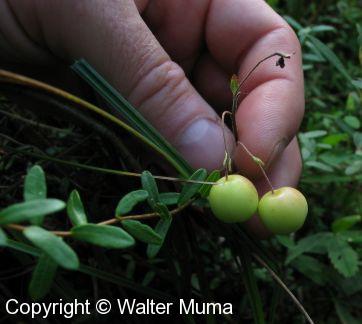Large Cranberry
Vaccinium macrocarpon |
Other common names:
American Cranberry

Other scientific names:
Oxycoccus macrocarpus, Vaccinium oblongifolium, Vaccinium propinquum

Family:
Heath Family (Ericaceae)

Group:
Cranberries

Distinctive features:
Sub-Shrub; Tiny plants, with delicate stems and leaves, but huge berries, relative to their size. This species produces flowers and berries on stalks branching from the stems below the end. They are either solitary or in small clusters.

Similar species:
•
Small Cranberry (Vaccinium oxycoccos)
•
Highbush Cranberry (Viburnum trilobum) - similar only in name.

Flowers:
Summer; Red/Pink; 4 parts (petals)

Leaves:
Alternate, Simple, Entire

Height:
Up to 15 cm (6 in); A very small, low-growing sub-shrub.

Habitat:
Wet Areas; Bogs.

Edible:
Berries are edible. Best if cooked.

Books:
Shrubs of Ontario: 403
Newcomb's Wildflower Guide: 128

Native/Non-native:
Native

Status:
Common in bogs.

Notes:
Cranberries are actually tiny shrubs, although most people probably wouldn't think of them as such. They grow in bogs. The main way to tell Large Cranberry and Small Cranberry (Vaccinium oxycoccos) apart is by the size of the berries.
This species is the one that is grown commercially.

Origin and Meaning of Names:
Scientific Name: macrocarpon: large-fruited

For more information visit:
Ontario Wildflowers

Photographs:
119 photographs available, of which 3 are featured on this page. SCROLL DOWN FOR PHOTOGRAPHS.

Range Map is at the bottom of the page
 |
|
|
|
|
|
|
|
|
|
 |
|
|
 |
|
|
 |

|
 |
The berries are an enormous size relative to the size of the leaves and the plant itself! |
|
 |
|
|  |
|
|
|
|
Range map for Large Cranberry (Vaccinium macrocarpon)
PLEASE NOTE: A coloured Province or State means this species occurs somewhere in that Province/State.
The entire Province/State is coloured, regardless of where in that Province/State it occurs.

(Range map provided courtesy of the USDA website
and is displayed here in accordance with their
Policies)
|
| |